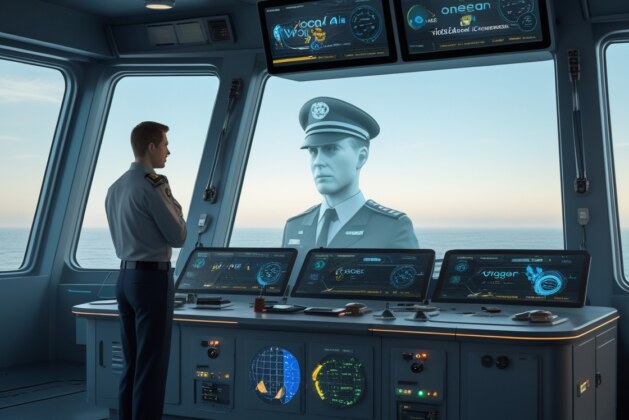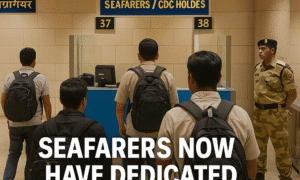Once, every ship had a Radio Officer. Then came GMDSS, satellite communications, and automation—and the role faded into history. Today, the 2nd Officer, long seen as the ship’s navigator and planner, might be heading toward a similar fate, thanks to the rise of AI and intelligent marine software.
The Evolving Role of the 2nd Officer
Traditionally, the 2nd Officer has been responsible for:
- Passage planning and route plotting
- Chart corrections and publication updates
- Meteorological monitoring and reports
- Sending noon reports and vessel position updates
- Operating GMDSS equipment
- Watchkeeping and bridge management support
But now, these core duties are being automated by software solutions that promise speed, accuracy, and optimization.
AI Has Already Boarded the Bridge
Here are some cutting-edge platforms that are redefining ship operations:
- Orca AI: Uses computer vision and machine learning to enhance situational awareness, detect potential collisions, and optimize navigation in congested waters.
- Voyager AI (by Voyager Worldwide): Automatically generates passage plans, provides real-time navigation data, and updates charts digitally—significantly reducing manual effort.
- OneOcean (Enhanced): Offers a fully integrated platform for voyage planning, compliance, and environmental management, including digital reporting tools and automated chart updates.
- Wärtsilä Navi-Planner: Allows remote voyage planning and execution, and integrates seamlessly with bridge systems to assist with decision-making.
- ABB Ability™ Marine Pilot Control: Provides automated navigation support, including route optimization and collision avoidance, especially for remote or unmanned vessels.
With these tools handling everything from planning to reporting, the traditional tasks of the 2nd Officer are shrinking rapidly.
What’s Left for the 2nd Officer?
The 2nd Officer is evolving into more of a system supervisor than a traditional navigator. Much like the Radio Officer once did, they now spend more time monitoring systems than actively creating or updating them.
AI doesn’t sleep, doesn’t forget chart updates, and can analyze thousands of data points instantly. With machine learning continuously improving decision-making algorithms, the question arises: Does the 2nd Officer still have a long-term place on board?
Is This the Beginning of the End?
The maritime industry is exploring:
- Reduced manning models
- Shore-based navigation teams
- Semi-autonomous bridge operations
- Multi-functional officers instead of specific ranks
For the 2nd Officer, this could mean:
- Less hands-on navigational work
- Greater emphasis on technical troubleshooting and systems monitoring
- Cross-training in compliance, cyber-security, and automation
Why the Human Element Still Matters—for Now
Despite all the tech:
- AI lacks judgment during unexpected emergencies
- Machines can’t match human adaptability in morally complex decisions
- System failures still require manual intervention
- Leadership, communication, and safety drills need people
So while AI tools like Orca AI and OneOcean enhance navigation, they’re not yet ready to replace human instinct and accountability entirely.
Adapt or Be Replaced
If you’re a 2nd Officer today, it’s time to reskill and rethink your future. Here’s how to stay relevant:
- Learn to operate and troubleshoot advanced navigation systems
- Gain data literacy and understanding of AI workflows
- Take courses in cyber awareness and integrated ship systems
- Stay updated on trends in maritime automation and compliance
The 2nd Officer role may not disappear entirely—but it will be transformed.
Final Thoughts
The Radio Officer didn’t disappear because they were less skilled—it happened because technology evolved faster than roles adapted. Now, the 2nd Officer is standing on that same cliff edge.
AI-driven systems like Voyager AI, Orca AI, and OneOcean are not threats—they’re tools. But the person who doesn’t know how to use them is at risk.
The future doesn’t eliminate seafarers—it demands smarter, more tech-savvy ones.
📢 If you’re a seafarer seeing changes in your duties because of AI, or have experience using these systems, share your story with us at shippys.org. Let’s document this digital evolution together.




Leave a comment